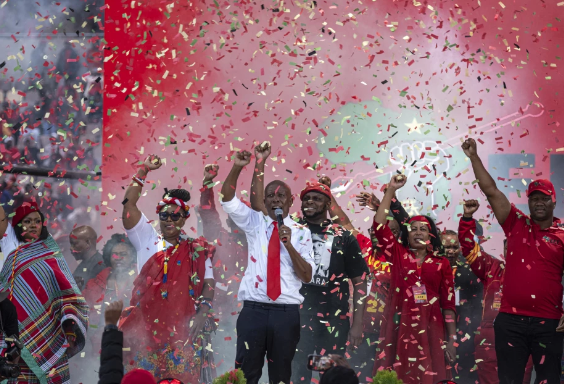South Africa Julius Malema, who parted ways with the ruling African National Congress (ANC) to establish a radical leftist party, could potentially become a kingmaker or even deputy president if the ANC loses its majority in the upcoming Wednesday’s election, as polls suggest.
The prospect of the ANC collaborating with Malema and his Economic Freedom Fighters (EFF) to retain power worries investors and the white upper-middle class that Malema criticizes.
The EFF’s proposals to nationalize gold and platinum mines and redistribute land from white farmers alarm those who fear the impact on their privileges and the country’s economy.
However, Malema’s message resonates with many constituents, including unemployed urban Black youths, middle-class students struggling with fees, and graduates facing job scarcity in a stagnant economy.
While the ANC promised widespread prosperity after liberating Black South Africans from white minority rule, economic disparities persist.
The wealthiest individuals, regardless of race, have seen their share of the wealth grow, leaving many others disillusioned with the pace of change.
A third of South Africans, including many Black voters with college degrees, are out of work.
“The EFF points out accurately … that we haven’t solved the racial issue in this country,” Steven Friedman, director of South Africa’s Centre for the Study of Democracy, said.
Yet, he added that Malema had failed to broaden the party’s appeal to those in extreme poverty in rural areas.
The Economic Freedom Fighters (EFF), characterized by its red shirts and berets reminiscent of socialist movements of the past, has made significant electoral gains, securing over 10% of the vote in national polls in 2019 and local ones in 2021.
However, party leader Julius Malema’s affluent lifestyle has drawn criticism from political opponents, who mock his affinity for luxury cars, gold watches, champagne, and opulent mansions. Malema’s controversial financial dealings, including allegations of corruption and tax arrears, have further fueled skepticism.
Despite the criticism, Malema maintains a strong support base, particularly among Black South Africans disenchanted with economic disparities. His ability to navigate and defuse racial and class tensions was evident during a 2020 rally in Senekal, where EFF supporters confronted white supremacists.
Malema’s background as the son of a domestic worker has shaped his political activism, propelling him to leadership positions within the ANC Youth League before founding the EFF in 2011 after his suspension from the ANC.
Often referred to as a “firebrand” or “militant” by critics, Malema’s leadership style is divisive, yet he garners affection from supporters who affectionately call him “Juju.”
Despite occasional controversies, such as his brief foray into xenophobic rhetoric in 2022, Malema and the EFF remain distinct in their stance on immigration, advocating for the free movement of Africans within the continent.
While this stance may cost them some votes, it distinguishes them as a unique voice in South African politics.



